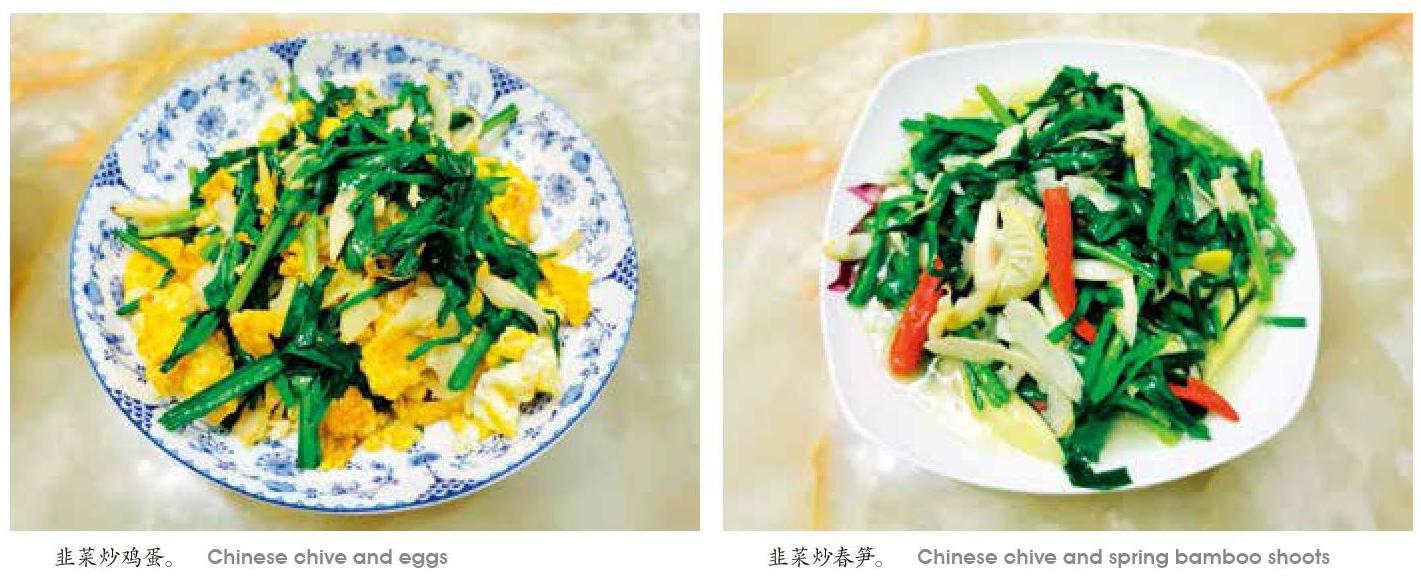立春韭菜引乡愁
2020-03-18袁明华
袁明华

《说文解字》说:“一种而久者,故谓之韭。”所以,韭菜又名“长生菜”。多种韭菜,日子便经得久。从《诗经》至今,韭菜的故事从未与过往的历史割裂过。
立春从一把韭菜开始。
早在冰雪覆盖之下,韭菜就期待春阳,准备了新衣,和一畦畦同样从冰雪中复苏过来的青翠欲滴的麦苗一样,都是接地气的春使,但韭菜似乎更具农家新春之神韵。
一
当乡间袅袅炊烟在春寒料峭的晚风中袭来缕缕韭香,我妈已经割下第一刀新韭,从鸡棚里摸两个热乎乎的鸡蛋——假如有新鸡下蛋,必定优选头窠蛋——立春立新,就如过年要做新衣服,穿新鞋子。我们小孩子在新春的暮色中打打杀杀,奋不顾身,似乎已经赢得了新春第一盘韭菜炒鸡蛋的优享权。
韭菜有深厚的植食文化积淀,从《诗经》至今,韭菜的故事就从未与过往的历史割裂过。比如南朝刘宋时期,周颙答文惠太子曰:“春初早韭,秋末晚菘。”意思是,早春雪融韭菜新,晚秋霜降青菜甜,是一部美食春秋的代表。比如杜甫的“夜雨剪春韭,新炊间黄粱”,绝对的家常便饭,却是酒逢知已千杯少,是诗人离乱中贴心的温暖。比如五代时期的杨凝式,午睡醒来,恰逢有人馈赠韭花,非常可口,执笔写了一封谢折,短短53字的手札,竟成就了天下第五行书。一把韭菜,成就文学史上的一段佳话。
而在我少年时的乡村经验中,韭菜其实是适合懒人种的菜。只要种下一畦,家里就不会缺菜。割了一茬长一茬,几乎一年四季都有得吃。而且还可以数年内不停地割,越割越长,生生不息,这是其他蔬菜做不到的。而且还很容易打理,房前屋后随便找块巴掌地都能长好,也不怎么害虫。懒人钟情于韭菜,人懒菜不懒,不辱懒人名声,甚至会给懒人带来好运。此等奇妙便生成了韭菜美好的寓意——长久。
《说文解字》说:“一种而久者,故谓之韭。”所以,韭菜又名“长生菜”。多种韭菜,日子便经得久。
包春卷为什么总少不了一味韭菜馅?用于包馄饨、包饺子,大致都有这么一层意思在。办进屋酒拜菩萨,甚至上坟祭祖,乡人都乐意用韭菜,因此轻视不得。
有些地方至今还保持着“咬春”的习俗,立春节气抢先吃韭菜,狠狠咬一口春天,咬住春天。
此番道理是爷爷告诉我的。
二
我爷爷是乡厨,做得一手好菜,也种得一手好菜,两头都受人尊重,被乡人敬称为“桂桂师傅”。
桂桂师傅做菜,绝活是“绝配”——文武笋,将春笋与莴笋弄一块儿;文武苹果,将树上的苹果与地下的苹果土豆弄一块儿;文武猪爪,将新鲜猪爪与咸猪爪弄一块儿。运河边的鱼羊鲜,将鱼肉和羊肉烧一块儿,尤其是甲鱼烧羊肉,那是农家上等菜。
而四乡八里最常见的韭菜炒鸡蛋,到了桂桂师傅手里要求就十分苛刻。原材料必须是春天或秋天地里现割,从割起到入锅不能超过一小时。炒成后,起锅盛盘里,韭菜要滴滴绿,鸡蛋要金黄雪白分明,金黄是金黄,雪白是雪白,不能和面一样糊一起。一看,一闻,一吃,都能感受到地里现割起来的鲜度和刚从鸡棚里摸出来的温度。
在爷爷手里,韭菜不光是主菜,还是百搭,是麻将里的财神,炒香干,炒笋丝,炒螺蛳肉等等,做什么都可以配。韭菜炒螺蛳肉是我的最爱。
桂桂师傅菜做得好,是四乡八里大家都知道的,但桂桂师傅菜种得好,恐怕只有我最了解了。他喜欢带着我帮他种菜,表现好了,让他开心了,会带我去临平街上聚乐园吃一碗肉丝面,面碗里必定是有一小撮韭菜或几根韭黄的。
桂桂师傅种韭菜,关鍵是畦田做得好,沟是沟,垄是垄,径是径,棱角分明,比木匠师傅弹出来的线还直。而且鸡粪羊粪焐得好,水也浇灌得好。一切都做好了,得空便去畦边田埂上守着抽管烟。
他是抽烟管的,尺把长的小竹管,装一个铜嘴头。抽着抽着,河边畦田里针尖般细密的绿色幼芽顶破土壤探出来了,连烟雾也在阳光下萦绕起一片春光。抽着抽着,叶脉渐渐变宽,一点一点向上生长,个把月的工夫,第一茬韭菜就可以开割了。
在过后的日子里,畦田就有了居家过日子的模样。韭菜一垄一垄此起彼伏,有的刚割完,有的长半高,有的郁郁葱葱在风中摇曳着等待被割。畦边整条河道充满了流动的韭香。
天凉了,韭菜生长慢了,桂桂师傅也在风中渐渐老去。桂桂师傅曾多次跟我说,人都是韭菜的命,一茬一茬被割去。接下来,该轮到我这一茬了。
三
老去的两垄韭菜开花了。油绿的韭菜顶端簇起一朵朵银色的小白花,未开的小花苞是鸡心的模样,米粒大的花骨躲在半透明的青衣里面,看上去清素雅致,有兰花的风采。秋蝶翩跹而来,花随风动,蝶影婆娑,成了畦田秋天最美的画卷。
那天傍晚,桂桂师傅坐在畦边田埂上抽烟管,用烟管指挥我去捉一只黑蝴蝶。
我追来追去怎么也追不着,一脚踩上了一坨烂泥巴。
晚霞在临平山顶上涌起火烧云,不可思议的红。
妈妈来割一把韭菜,顺便喊我们该回家洗洗,准备吃饭了。今晚就做一个韭菜炒鸡蛋,还从小店里买了三毛钱什锦菜。
一缕强光斜过来,正击中桂桂师傅的脸面,我看到他的双眼血红血红,有浑浊的红色液体从那里流出来,流出来,接着包裹了他的全身。
记忆中的那个血色黄昏,后来又有一只黑蝴蝶始终悬空飞舞在一朵白色小花之上,我把它赶走了,它又飞回来悬舞在白色小花的正上方。
那年秋天迟迟不肯远去,后来也确实出了许多大事。
当同样的画面出现在来年春天畦田上空时,我的爷爷桂桂师傅已经倒在了病床上。
但那年霜降后,他又在韭菜畦田里培育了三垄韭黄。培育韭黄需要花更多心思,需要更多的守护,入冬后的日子,除却给乡间红白喜事做酒菜,他几乎天天守护在畦田里。我说,爷爷,你总是流泪,韭菜吃多了对你的眼病不好吧?
我爷爷身体一直强健,除了迎风落泪,没有其他毛病。他说,韭菜阳气重,吃多了眼睛会充血,但韭黄随和,韭黄炒香干比韭菜炒香干好吃,所以冬天里要把韭黄培植好。“我们村里都不会种,过年都是去临平菜市场买的,我就带个头吧,我已经捉摸好几年了。”
我家桂桂師傅培植的韭黄那年冬天大告成功,印象中年夜饭就吃上了,正月里派上了大用场,邻里亲戚每家也都送了一点。
爷爷倒在病床上的三年里,据我妈后来回忆,总是念叨着要吃韭菜,一会儿韭菜,一会儿韭黄,一会儿又要韭花。
后来我妈也被接着的一茬割走了。
再后来,我老家李家桥整个村被开发区征用,韭菜畦田从此消失。
但春天里流动在河道里的韭香伴着秋天那个血色黄昏,一直留在了我故乡的记忆中。
(部分图片由CFP提供)
The Chinese solar terms begin with “” (“Beginning of Spring”), an agricultural symbol of which is the Chinese chive. Traditional Chinese farmers believe the little, yellowish sprouts waking up from winter chill are the harbingers of a brand-new year of plenty.
My childhood memory is full of the fragrance of Chinese chive sprouts freshly cut from the fields. When the refreshing scent came with the smoke curling up from kitchens, I knew the winter was over and there would be a plate of my favorite springtime delicacy waiting for me on the table. A pious believer in rituals, my mother would make sure to use the first nest of eggs from the henhouse to make the dish.
The tradition of eating Chinese chives dates back to the ancient times of China. Legend has it that Zhou Yong, a man of letters in the Southern Dynasties (317-589), once shared his epicurean thoughts with a prince by pointing out that the Chinese chives is the ideal early springtime delicacy.
One of the poems by Du Fu (712-770) also mentioned the poets weakness for the first harvest of Chinese chive sprouts. For him, the homey treat is not just a delight to taste buds but more of a cure of his frustrated mood and broken heart.
The cultivation of Chinese chives is comparably easy. You reap what you sow throughout the year. They grow fast, and are easy to take care of. And like a box of gifts, they keep producing surprises and bringing harvests to green thumbs as well as newbies, hence its nickname, “a vegetable that lives forever”.
Chinese chives is a favorite ingredient in Chinese culinary habits, used in a collection of dumplings and “” (Spring Rolls) for its strong fragrance as well as its auspicious name (the Chinese pronunciation “” suggests “long-lasting” and “forever”).
The tradition of “” (literary “the first bite of springtime”) is still practiced by many rural people in China. My grandpa never got tired of reminiscing the thrill and joy of the “bite” – that is, to enjoy the best of spring and hold fast to the sweetest time of the year.
My grandpa was a village cook who also knew all the secrets about how to reap what one sows. In the kitchen, he was a perfectionist who never made do with the second best when it came to the ingredients. Fondly called “Chef Guigui” by fellow villagers, he did his best to make sure that each of the dishes was a piece of art that delighted all senses. I can still remember how the freshness and tenderness of the chive sprouts was preserved from his magical hands. Even the temperature of the eggs could be told.
Chinese chives used to be a favorite ingredient of my grandpas culinary innovation that is full of his life philosophy. When I was a little child, I would enjoy a big bowl of noodles with shredded meat after offering a helping hand in my grandpas vegetable garden, as a reward from him. He took care of the spring sprouts just like taking care of his children, giving them the best they deserved. Hed spend most of his day on the ridges smoking his bamboo pipe and watching the sprouts break through the soil. The lovely spring view and the prospect of the first harvest that would come about in one month would make him very happy and content.
“A lifetime is just like the life cycles of the chives; one crop after another, and then it is you that get taken away. You just wait for your turn,” he would murmur, more talking to himself than trying to tell me something about what life really was.
After two crops, my grandpas chive fields presented a spectacular view of little, whitish flowers gently swaying in late summer breezes and attracting butterflies. One day at dusk, my grandpa was sitting on the ridge and smoking his pipe. “Catch that black butterfly!” He said to me, pointing at the butterfly with his pipe. The sunset glow of that moment was scarlet red, cascading on the face of my grandpa. It looked as if blood were streaming out of his eyes.
He was bed-ridden for about three years before he passed away. “Chives are not good for your eyes, grandpa,” I would try convincing him and he would not listen. My mother had to make all kinds of chive dishes just to make him happy.
A few years later, my mother was taken away by the Grim Reaper. Somehow, I feel lucky for her because she did not have to see my grandpas chive fields and the whole village vanishes into the massive urbanization of the region.
I have since been haunted by that bloody twilight, and butterflies.
